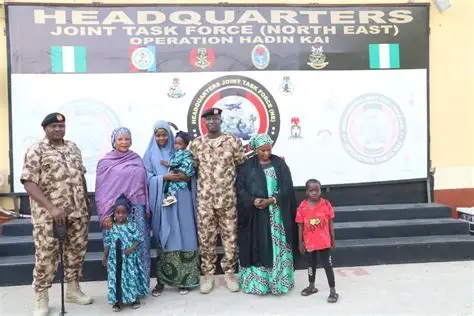
The phrase Operation Hadin Kai major rescue Borno encapsulates the significant military achievement in Borno State where troops from the joint task force rescued 86 kidnapped victims and arrested 29 suspected terrorist logistics suppliers. Troops from the 135 Special Forces Battalion under the joint task force encountered insurgents along the Buratai–Kamuya Road on November 9, acting swiftly to thwart a mass abduction attempt.
According to the statement from the Media Information Officer Lt Col. Sani Uba, the troops discovered that insurgents of Boko Haram and ISWAP were abducting civilians and vehicles at Dutse Kura. The follow-up encounter near Mangari resulted in the destruction of 11 makeshift terrorist structures and the rescue of 86 kidnapped victims (men, women and children).
Among the recovered items: one AK-47 rifle, five magazines with 73 rounds, four PKT ammunition belts, five civilian vehicles, five motorcycles, eight bicycles and two logistics tricycles. The insurgents fled in disarray.
In a related operation at Mangada, the troops arrested 29 suspected terrorist logistics suppliers en route to Chilaria with two pickup vans and a tricycle laden with about 1,000 litres of petrol in jerricans, four gallons of engine oil, two new gun-truck tyres, a cache of medical consumables and large quantities of food stuffs.
This event highlights how the Operation Hadin Kai major rescue Borno initiative is more than just a tactical victory—it disrupts the insurgents’ logistical chain, dismantles their camps, and frees civilians held by the terrorists. The fact no troop casualties were recorded further underscores the professionalism and effectiveness of the mission.
The success in Borno comes amid a series of operations by the Nigerian Armed Forces where hundreds of kidnapped victims have been rescued and insurgents neutralised. For example, over 7,000 hostages were rescued in 2024 across theatres of operation.
By placing a spotlight on Operation Hadin Kai major rescue Borno, it reaffirms the commitment of the military to deny terrorists freedom of action in the North-East theatre. The dismantling of logistics suppliers is particularly important because insurgents rely heavily on fuel, food, vehicles and informal supply chains to sustain their operations.